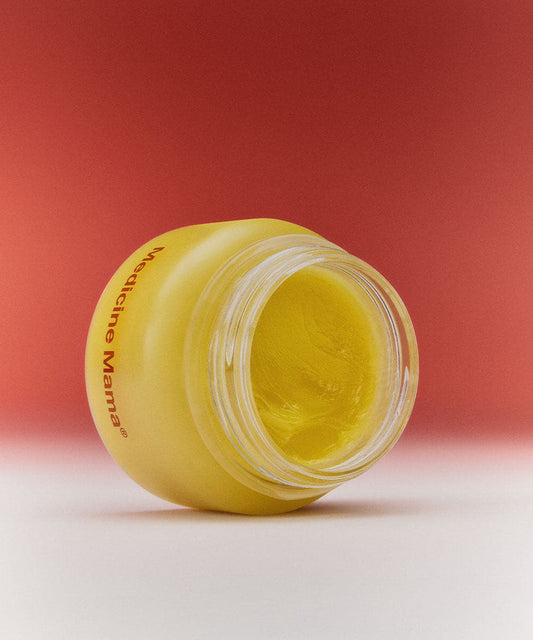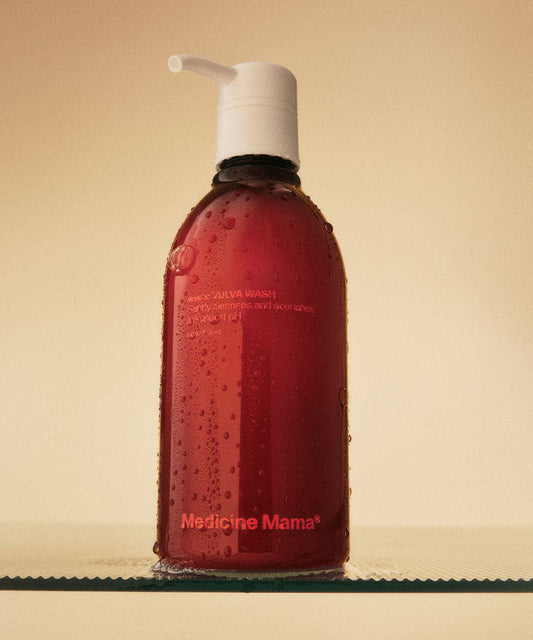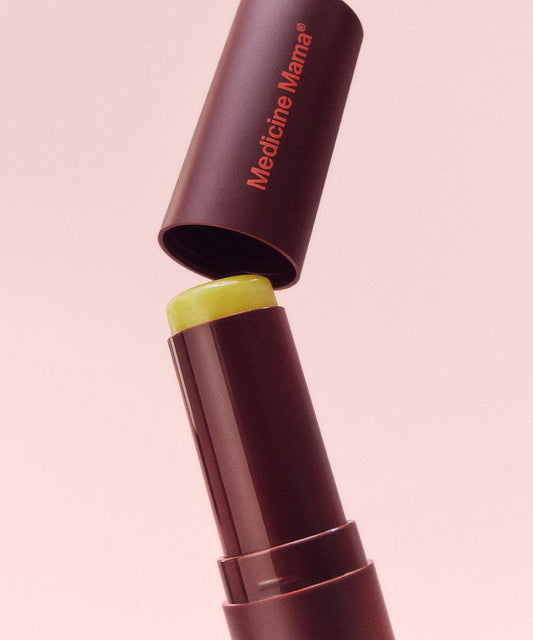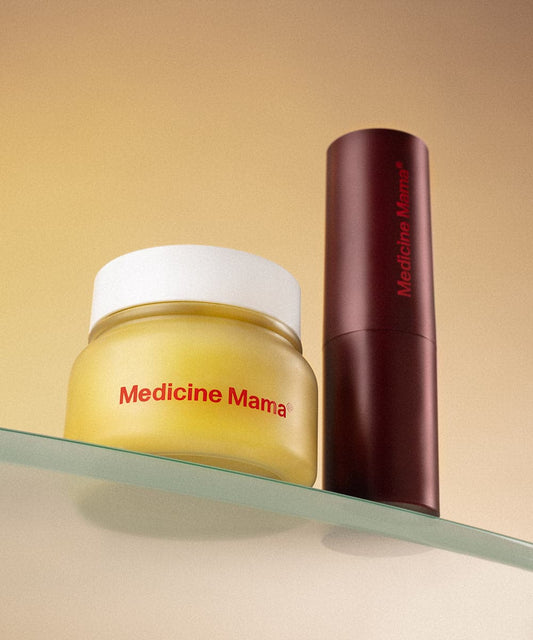
Reviewed by | Dr. Clare Bertucio MD
As we age, our bodies begin to go through several changes due to decreasing estrogen levels as we begin to reach the end of our reproductive years. For most women, menopause occurs in their late 40s to early 50s.
Before menopause, however, many women experience a transitional period known as perimenopause. Perimenopause can last anywhere from a few months to up to 4-5 years, and you aren’t considered to be in true menopause until you haven’t had a period for 12 consecutive months.
Every woman experiences different symptoms during perimenopause. Some have extremely mild symptoms and may only notice that their periods have become irregular, while others will experience a wide variety of uncomfortable symptoms such as hot flashes, mood changes, and decreased sex drive.
Keep reading to learn more about perimenopause, what to expect, and what you can do to help manage and reduce your symptoms with the help of Medicine Mama’s Apothecary!
What is Perimenopause?
Perimenopause is a natural part of aging, and the majority of women will experience perimenopause symptoms in their early to mid-40s before true menopause begins – although some women experience these symptoms as early as their late 30s.
During perimenopause, our ovaries decrease production of estrogen until they are producing only a fraction of what they used to. Your ovaries will also slowly stop releasing eggs which will cause you to skip and eventually stop having periods. When you go 12 consecutive months without a period, you will officially be in menopause.
Just as the symptoms of perimenopause vary from woman to woman, so do their periods. Some women stop having their periods almost immediately after beginning perimenopause, whereas others may continue to have erratic periods for months or years.
While it’s impossible to tell exactly when you’ll enter perimenopause or menopause, there seems to be a strong correlation between mothers and daughters. So, if your mother entered menopause at an early age, then there’s a good chance that you will as well.
What's the Difference Between Perimenopause and Menopause?
Perimenopause is a transitional stage in a woman’s life that is the body’s way of saying that it is reaching the end of its reproductive years. There are two distinct differences between perimenopause and menopause.
The first is that in perimenopause, you may still have occasional and erratic periods. To be considered to be in menopause, your periods must have stopped completely for 12 consecutive months.
The second major difference is that, for women who have symptoms, the symptoms will be significantly worse in perimenopause than they are in menopause. The symptoms that everyone associates with menopause such as hot flashes, night sweats, poor sleep, weight gain, etc. are actually symptoms of perimenopause.
These symptoms typically begin to fade as your hormones stabilize throughout true menopause and the postmenopausal stage.
When Does Perimenopause Begin?
For most women, perimenopause will begin in their mid-40s, however, for others it may begin in their late 30s or early 50s. Typically, perimenopause begins slowly and the transition is gradual rather than sudden.
If you have a procedure which requires your ovaries to be removed or if they are damaged, then you may enter perimenopause earlier than normal – and you may experience more sudden and intense symptoms than you otherwise would have.
When Does Menopause Begin?
What we know as menopause actually starts with perimenopause, and together it is all called the “menopause transition”. For most women, this transitional period will begin around the age of 45, however it can begin as early as the late 30s or as late as 55.
This transition from perimenopause to menopause can be as short as 12 months or it can last for years – as long as 12 years for some women. The one common factor is that you will not be considered to be in menopause until you have gone a full 12 months since your last period.
If you have very irregular periods or spotting, it can be difficult to determine when it has been a full 12 months since your last period. This is why it is important to keep track of all of your periods, spotting days, and symptoms and to be open and honest with your doctor. They will be able to tell you when with certainty when you have reached menopause.
What are the Symptoms of Perimenopause?
Every woman experiences perimenopause differently. Some women have little to no symptoms and their transition from perimenopause to menopause goes smoothly and takes around a year.
More commonly, perimenopause will last a few years, and you will experience a wide range of symptoms. These symptoms may come and go, may occur all at once, or may only occur one or two at a time. There are a variety of symptoms that you may experience including:
- Insomnia
- Irritability
- Depression
- Hot flashes
- Headaches
- Mood swings
- Night sweats
- Bladder leaks
- Forgetfulness
- Vaginal dryness
- Decreased libido
- Decreased fertility
- Urinary incontinence
- Difficulty concentrating
- Joint and muscle aches
- Irregular or sporadic periods
- Loss of vaginal lubrication and elasticity
- Bone loss potentially leading to osteoporosis
When you look at all of the symptoms laid out, it can definitely be a daunting list! When these symptoms combine, it can make you feel like a stranger in your own body. More rarely, other even stranger symptoms can hit you out of nowhere such as:
- Itchy skin
- Hair loss
- Brittle nails
- Bloating and gas
- Breast tenderness
- Dental issues such as gingivitis
- A sudden and drastic change in allergies
- Tingling in extremities or a shocking or vibrating sensation
Thankfully, there are many treatment options available including hormonal and non-hormonal treatments, over-the-counter medications and vitamins, and natural, holistic treatments that can help alleviate many of these symptoms.
If you are experiencing any of these symptoms and they are causing you discomfort in your everyday life, reach out to your primary care doctor or OB-Gyn. They will be able to give you the best advice on how to manage your symptoms.
Can Perimenopause Symptoms be Prevented?
Although there’s no way to completely guarantee that you won’t experience perimenopause symptoms, there are many things that you can do to reduce the severity of your symptoms.
Fixing Hot Flashes
Hot flashes are caused by hormonal fluctuations due to your ovaries producing less and less estrogen. This can cause your body to believe that it’s overheating which leads to it sweating in an attempt to regulate itself.
Try to exercise regularly, at least 150 minutes a week, and eat a healthier, more balanced diet. There are also several herbal remedies and vitamins that may help, which you should talk to your doctor about.
Fixing Mood Swings
Another symptom caused almost entirely by fluctuating hormone levels, mood swings can occur when your progesterone and estrogen levels are unbalanced. If you had extreme PMS symptoms when you were younger, then you may experience severe mood swings in perimenopause.
Exercising regularly, avoiding processed foods and refined sugars, and ensuring that your blood sugar levels are stable can help to reduce mood swings. If those steps don’t work, then speak with your doctor about alternate treatment options to help you feel more like yourself again.
Fixing Migraines and Stress
When your hormones are on a rampage and your body is going through a significant change, it’s no surprise that you may be feeling more stressed than usual. This stress can manifest as headaches, migraines, or muscle and joint pains.
The best way to treat stress and the pain that comes with it is to practice self-care and relaxation techniques. Try to take some time for yourself daily to rest and recharge by reading a book, watching a favorite TV show, listening to music, or doing anything else that you enjoy.
Other things to try are taking bubble baths a few times a week, practicing deep breathing exercises when you feel yourself getting overwhelmed, or doing yoga or tai-chi.
Fixing Vaginal Dryness and Itchiness
Many women experience changes in their vaginal and vulvar health during perimenopause. This can cause discomfort, pain, and embarrassment when you are trying to get intimate with your significant other. The longer that you leave vaginal atrophy untreated, the worse it will get.
For vulvar atrophy symptoms, try adding our Vmagic Vulvar Balm, Vmagic Feminine Wash, and our Vmagic Feminine Lipstick to your daily routine! These all-natural, holistic products were specifically designed to help women regain moisture and protect their most sensitive areas.
When Should You Talk to a Doctor About Perimenopause?
Every woman on Earth goes through menopause at some point in their life – the only exception being if you had your ovaries removed before you went through puberty. Menopause, and perimenopause, are completely natural and you shouldn’t be embarrassed to talk to your doctor if you are experiencing symptoms.
Your doctor should take all of your symptoms and concerns seriously and should be able to provide treatment options and a treatment plan to help you with them. And remember, if you aren’t comfortable talking to your doctor about your concerns, don’t be afraid to find a new doctor that is a better fit for your needs.
How Does Perimenopause Affect My Sex Life?
Perimenopause is a time of significant change for your body. Because of that, you may experience that you are less interested in sex during this time of your life. While that is not the case for every woman, as some may actually have an increased libido due to hormonal changes, it is normal.
Vaginal atrophy is common in perimenopause, affecting up to 85% of postmenopausal women. This can make sex uncomfortable, painful, and all-around undesirable. There are many treatment options available to combat vaginal atrophy, however, and you should talk to your doctor as soon as you begin having symptoms.
Many women also experience an unintentional decrease in intimacy with their partners during this stage in their life as well. That lack of intimacy can be caused by an emotional disconnect, but it doesn’t have to stay that way.
Communication with your partner is essential, and it is important to remember that you can still be intimate, loving, and affectionate with them without having sexual intercourse. But, if you still want to engage in sex, then be sure to be open and honest with your partner and use lubrication to ensure that it is pleasurable for both of you.
Is it Possible to Become Pregnant During Perimenopause?
Yes! Although your chances of becoming pregnant get smaller the longer that you are in perimenopause, as long as you are still having periods, you can get pregnant. You are not in menopause – and therefore finally unable to get pregnant – until you have gone a full 12 months without having any period at all.
That means that even if it’s been 10 months since your last period, there’s still a chance that you could get pregnant. So if you’re still sexually active, make sure that you’re using protection until you officially get the all-clear from your doctor!
How to Increase Your Libido During Perimenopause
It can be frustrating when your libido doesn’t match your partner's, especially if you wish that it did. Although there is no overnight fix to it, and It takes time to increase your libido, there are steps that you can take to improve it.
First, try using moisturizers or lubricants to help make sex more pleasurable, and be open and honest with your partner about what you like and dislike. It can also help to schedule time for sex so that you have the opportunity to prepare beforehand for it, although some women may prefer more spontaneity.
In that case, focus on foreplay rather than diving right into penetrative sex. Foreplay can help your body relax and get ready for sex and it will make the experience more pleasurable for both of you.
How Can You Treat Perimenopause Symptoms?
If you are experiencing vaginal dryness, vulvar dryness, discomfort during sex, or a lowered sex drive, then it’s time to take charge of your vaginal health and start treating your perimenopause symptoms.
Just because perimenopause is natural, that doesn’t mean that you just have to live with all of the uncomfortable symptoms! There are several over-the-counter, all-natural treatment options available depending on your needs.
Natural Perimenopause Treatments
Hormone replacement therapy and medication may be the most common treatments for perimenopause symptoms, but there are a few natural options that you may want to consider as well.
You may benefit from regular aerobic exercise, yoga, meditation, and deep breathing exercises. These practices can help reduce irritability and hot flashes as well as improve sleep. It may also help to avoid alcohol and hot drinks as these can lead to dehydration which can exacerbate your symptoms.
What Vitamins/Supplements are Good for Perimenopause?
There are several vitamins and supplements for perimenopause treatments that can be bought over-the-counter which may help with your perimenopause symptoms. However, it is important that you speak with your doctor before taking any of these vitamins as some of them may interfere with other medications that you are taking or health conditions that you may have.
Some vitamins and supplements to consider include:
- Black cohosh: May help with hot flashes
- Flaxseed: May help with night sweats
- Calcium: May help to prevent bone loss
- Vitamin D: May help with cognitive function and energy levels
- Ginseng: May help with memory loss
- St John’s Wort: May help with mood swings
- DHEA: May help with low libido and hot flashes
How Our Products Can Help
While there are several perimenopause treatments without hormones available that can help you alleviate and reduce your symptoms, there are few that are specifically made for your vulvar symptoms.
At Medicine Mama Apothecary, we created a proprietary blend of all-natural, hormone-free ingredients that are specifically designed to help reduce discomfort and irritation in your most vulnerable areas.
When used daily, our Vmagic Vulvar Balm helps to soothe the dryness and discomfort of the vulva without irritation. It is the perfect solution to prevent itching, pain, and discomfort, and it can help to make sexual intercourse more comfortable.
Another option we offer is our Vmagic Feminine Lipstick, which is the same formula as the Vmagic Vulvar Balm, but in the form of an on-the-go vulvar lipstick that you can apply throughout the day as needed.
If you want more information on how our products can help you, or if you are interested in hearing more about their effectiveness in a clinical trial, please reach out to our customer service team today!
Reference:
1.https://womaness.com/blogs/blog/perimenopause-all-you-need-to-know
3.https://www.mayoclinic.org/diseases-conditions/perimenopause/symptoms-causes/syc-20354666
5.https://www.health.harvard.edu/womens-health/perimenopause-rocky-road-to-menopause
8.https://www.webmd.com/menopause/ss/slideshow-menopause



